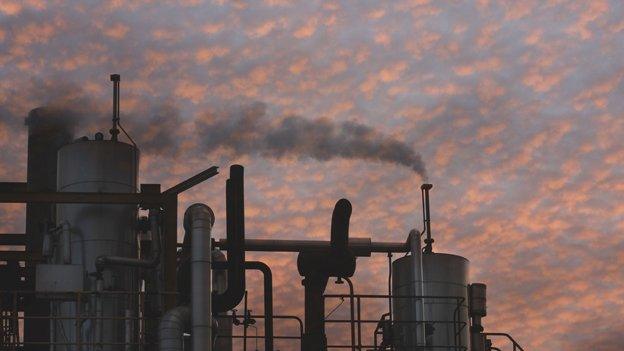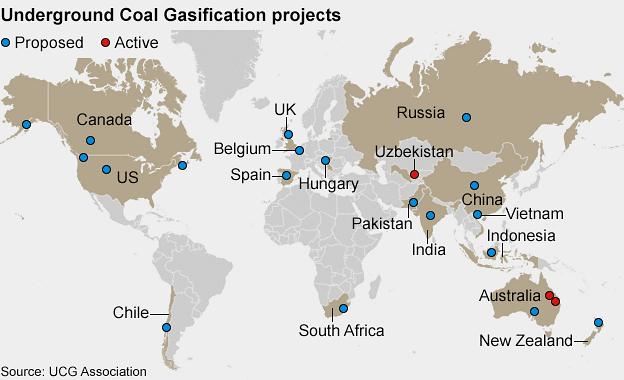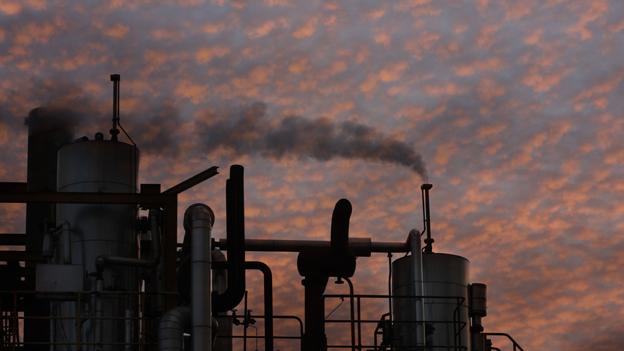Scottish moratorium on underground coal gasification confirmed
- Published

Cluff Natural Resources halted work on its Kincardine project in August
The Scottish government has imposed a moratorium on underground coal gasification (UCG).
Cluff Natural Resources had been planning to use the technique to extract gas from under the Firth of Forth near Kincardine.
The company halted work on the project in August until the political debate on the issue was resolved.
Campaigners had been calling for UCG to be added to the existing moratorium on onshore unconventional oil and gas.
The Scottish government said it was treating UCG as a separate technology to onshore unconventional oil and gas, which includes hydraulic fracking.
It said it was adopting a "cautious, evidence-based approach" to both techniques, with a separate moratorium on UCG allowing the necessary time for "full and careful consideration of the potential impacts of this new technology".

What is underground coal gasification?

The UCG process has been around since the 19th Century, but is only now becoming commercially viable thanks largely to technological developments and the rising price of gas.
Its supporters argue it is a new and cleaner way of extracting the estimated 85% of the world's coal reserves that are too deep to mine using traditional techniques.
The process involves pumping oxygen and steam through a small borehole into the coal seam to produce a small and controlled combustion.
Unlike coal-bed methane, therefore, the actual coal is converted from a solid state into gas.
The hydrogen, methane, carbon monoxide and CO2 are then siphoned off through a second borehole.
According to Dr Harry Bradbury, founder and chief executive of UK clean energy company Five Quarters, this process results in 20% of the CO2 produced from traditional coal mining.
But environmental campaigners have claimed that UCG is a risky and experimental technique, with a "very chequered history" around the world.

The SNP had been due to hold a potentially divisive debate on the issue at its autumn conference later this month.
Prof Campbell Gemmell, the former chief executive of environmental agency Sepa, has been appointed to lead an independent examination of the issues and evidence surrounding UCG.
Ministers have informed the Scottish Parliament that the government will carry out a "thorough and wide-ranging research process" into the potential impacts of such onshore techniques.
They have also published a planned research and public consultation timetable, and confirmed that the public consultation will begin once the research process has been finalised and the results published.
Energy Minister Fergus Ewing said: "We should never close our minds to the potential opportunities for Scotland from new energy technologies - but we must also ensure that community, environmental and health concerns are all fully taken account of.
"The research we propose in this timetable will give all interested stakeholders important information to allow a more informed debate during the public consultation.
"In line with our evidence-led approach we are today also putting in place a moratorium on the onshore planning of underground coal gasification developments to allow time for full and careful consideration of the potential impacts of this technology for Scotland."

ANALYSIS
By BBC Scotland's Andrew Black
The issue of unconventional energy extraction is a tricky one for the Scottish government.
Ministers have already announced a moratorium - basically a fancy word for an indefinite ban - on unconventional oil and gas extraction methods, like fracking.
There's been huge pressure from green groups, and ministers say further research is needed, given the various environmental concerns which have been raised.
Today the Scottish government has widened out that ban to cover what's known as underground coal gasification - that's a process where hard-to-reach coal is converted to gas.
But there's a political dimension to this as well as an environmental one.
The Conservatives reckon this has nothing to do with Scotland's best interests and everything to do with the SNP trying to avoid a potentially divisive debate on the issue at its annual conference next week.
Those claims are flatly denied by senior Nationalists, who say it's the duty of the government to make sure methods like coal gasification are safe before they get the go ahead.
Nevertheless the SNP knows this is politically sensitive. On the one hand, environmental groups are demanding the ban be made permanent. On the other, some energy firms say methods like fracking are needed to keep the lights on.
And in the middle, is the SNP trying to work out where voters stand, just seven months away from an election.

While powers to award onshore unconventional licences are being devolved to Scottish ministers, powers to award operators exclusive rights to exploit coal resources for UCG rest with the UK government and the Coal Authority.
Because of this, the Scottish government said the moratorium on UCG would be implemented at Scottish planning authority level.
Cluff chief executive Alex Cluff said he was "very disappointed and surprised" by the moratorium announcement.
He said: "We have made a publically-stated commitment to carry out a full environment impact assessment prior to submitting a planning application.
"That assessment would have provided the Scottish government with all the information that they require.

Cluff has estimated there are up to 335 million tonnes of coal under the seabed in the Firth of Forth
"It seems to me to be very much a politically-driven issue and not, in my humble opinion, an issue that is in the public interest."
Mr Cluff added: "The question you need to ask is what is Scotland going to do after the closure of Longannet takes 40% of Scotland's electricity-generating capacity out of the system? I would say it's a very serious situation.
"This [gasification] is not the whole solution - it is part of the energy mix - and to delay it by another 18 months when there is a crisis looming up rapidly is in my opinion ill-judged."
Mr Cluff has previously argued that UCG would "represent a major advance towards Scottish energy self-sufficiency and is therefore entirely consonant with the concept of Scottish independence."
'Full ban'
But the announcement was welcomed by environmental groups.
Lang Banks, director of WWF Scotland, said: "While this rightly puts a hold on underground coal gasification for now, we hope the final decision will be to rule it out completely."
Mary Church, head of campaigns at Friends of the Earth Scotland, said: "We are confident that when the evidence is independently assessed and the Scottish public have had a chance to voice their concerns, this consultation will lead to a full ban on unconventional gas and fracking."
Scottish Conservative energy spokesman Murdo Fraser accused the Scottish government of ignoring scientific evidence on the issue.
He added: "A recent report from Biggar Economics stated that underground coal had the potential to create a multi-billion pound industry in Scotland, supporting 5,000 jobs.
"It is disappointing that this opportunity is being put on the back-burner as a result of the SNP's internal difficulties. The SNP need to start listening to the scientific evidence on this and on so many other issues."
Scottish Labour welcomed what it described as Mr Ewing's U-turn on UCG.
The party's environmental justice spokeswoman, Sarah Boyack, said: "For months now the SNP has faced the accusation of being two faced on fracking and unconventional gas by campaigning in elections on anti-fracking platforms whilst reassuring big business behind the scenes that Scotland would be open for business.
"They can't have it both ways but it looks like they're going to try to until at least the 2016 elections."
- Published21 September 2015

- Published27 August 2015

- Published22 February 2015

- Published10 November 2014

- Published14 April 2014
